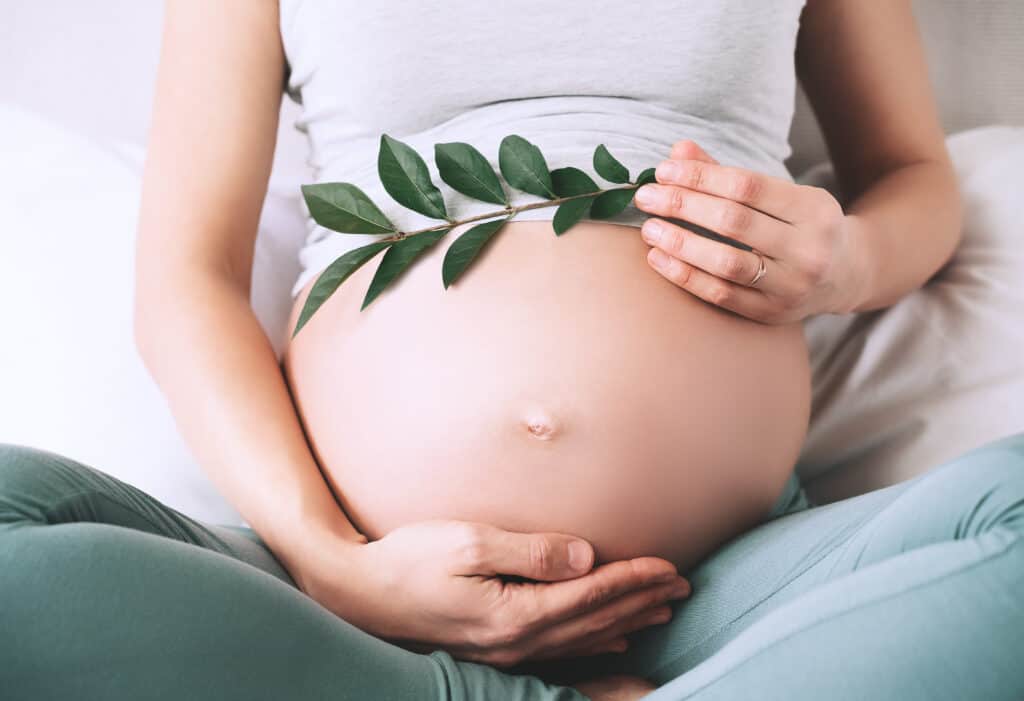You may also have noticed that many couples don’t start family planning until later in life.
While there are of course still some young mothers, the average age for having a first baby is now in the late twenties, or even early thirties in many European countries.
Some mothers even become pregnant at the age of 50.
How does this happen, and what should be considered with such a late pregnancy?
If a woman becomes pregnant at the age of 50, she’s certainly not only wondering whether she can still cope with childbirth and raising a child at this age, but she’s probably also seeing those around her taking a critical view of the pregnancy.
Still, the happiness of an older mother shouldn’t shock anyone anymore, should it?
If Hollywood is to be believed, 50 is the new 40, or even the new 30.
Whether it’s Sandra Bullock, Sarah Jessica Parker or Courteney Cox, anyone who sees these actresses wouldn’t even think they were already half a century old.
However, while the lords of creation have always foreseen offspring beyond the age of 50, it’s extremely rare to get pregnant at 50.
But whether through egg donation or naturally, having a baby at this age is not totally out of the question.
To what extent do women in their fifties become pregnant?

Most women have definitely completed their family planning by the time they reach their mid-forties.
The probability of becoming pregnant naturally decreases rapidly with age, and health insurance companies generally do not cover part of the cost of artificial insemination for women over 40.
But even if it becomes increasingly unlikely to have a baby, it is in principle possible to become pregnant up to the onset of the menopause, i.e. the last menstrual period.
The menopause marks the transition from the fertile period to the infertile period, also known as the climacteric period.
Since this last menstrual period begins around the age of 45 to 55 (average for women aged 51 to 52), it’s not impossible to become pregnant at 50.
Around 0.01% of women become pregnant at this age.
Natural pregnancy at 50

Although the chances of a natural pregnancy decrease after the age of 35, it is not impossible to become pregnant at 50.
For most women, conception this late in life comes as a great surprise.
In many cases, women may not have been as careful with contraception during the menopause.
After all, pregnancy is actually quite unlikely.
Pregnancy is often only discovered at a late stage, or confused with symptoms of the climacteric period, as menstruation may already be irregular.
The joy of late-term babies thanks to reproductive medicine

In contrast to a surprisingly natural pregnancy, there are also women who deliberately become pregnant at 50 and often have to resort to artificial insemination.
There are many reasons for this.
Perhaps there are already children who have left home, or family planning was not previously carried out due to career or lack of partner.
Nowadays, a woman can be artificially inseminated even without regular ovulation, with the help of an egg donation or by using her own frozen eggs through social freezing.
Risks of pregnancy at 50

While pregnancy after age 50 is always possible, it is not without its risks.
From the age of 35, doctors assume that a pregnancy is at risk, and ultrasounds are performed more frequently than for young mothers.
Among other things, the risk of chromosomal disorders such as trisomy 21 increases with the mother’s age.
Other genetic anomalies in the baby are also possible.
However, a chorionic villus biopsy or amniocentesis can provide clues to possible disorders.
Because of advanced age, complications during pregnancy are also more likely for the mother-to-be.
For example, gestational diabetes and miscarriage or premature birth are more common than in younger mothers, and in most cases doctors recommend a Caesarean section as the delivery method from the outset.
However, late pregnancy also has its advantages: women over 50 generally have both feet firmly on the ground, and are better able to support their child, financially speaking.
What is the relationship between maternal age and Down’s syndrome?

The answer is: the adhesive protein cohesin.
Cohesin is located in a woman’s egg cells, and its function is to hold the chromosomes contained therein in position.
The adhesive protein stabilizes the chromosomes and ensures that the cell division process runs smoothly.
As a woman ages, cohesin’s binding strength diminishes.
However, without sufficient binding strength, chromosomes can fall apart and genetic material is no longer evenly distributed.
This can lead to chromosomal abnormalities such as Trisomy 21.
In order to detect the genetic defect as early as possible, a blood test around the ninth week of pregnancy can provide information.
Fragments of the child’s DNA are isolated from the mother-to-be’s blood and examined for genetic abnormalities.
This makes it easy to detect trisomy late in pregnancy.
Parents diagnosed with Down’s Syndrome then have sufficient time to prepare for the situation, and can take charge of individual support measures.
Other possible complications of childbirth at 50 include

- High blood pressure
- Edema (water retention)
- Pre-eclampsia (belongs to the group of hypertensive diseases of pregnancy)
- Poor liver values
What’s more, the uterus is not as well supplied with blood at this age, which can lead to under-supply of the embryo.
Late pregnancies are therefore much more closely monitored than earlier ones.
What’s the right thing to do during pregnancy?

Pregnancy is a challenge for the body.
It takes a lot of strength to ensure a little second life.
This is especially true at age 50!
To make pregnancy as optimal as possible, pregnant women need to reconsider their behavior in certain areas.
A healthy diet, moderate physical activity, no smoking: these are the ideal behaviors during pregnancy.
Some of the things you used to do on a daily basis are no longer possible.
The woman’s body is working at full capacity.
It’s important for pregnant women to consciously take care of themselves and listen to their bodies.
Because the mother’s behavior is an important factor in ensuring an uncomplicated pregnancy.
Free time is very important during pregnancy, for example.
This applies not only to 50-year-old pregnant women, but also to all others.
Whatever your age, these tips will be invaluable to you.
1. Take targeted breaks

Many women already feel tired and listless during the first trimester of pregnancy.
It’s not easy having to shift into high gear when they could manage their work and leisure activities with a snap of their fingers just a few weeks ago.
Nevertheless, it’s important to consciously take a breath and plan for breaks.
It’s not for nothing that the Maternity Protection Act provides for extended rest periods for pregnant women in the workplace.
Particularly in the last trimester of pregnancy, shortness of breath and, possibly, sleep disturbances are added to the equation.
Despite this, imposing a well-planned day on yourself is not very beneficial for mother and child.
Follow your body’s slow rhythm.
It’s perfectly normal to ask for help or take advantage of offers more often.
2. Avoid stress

Avoiding stress as much as possible is part of healthy behavior during pregnancy.
Tense moments are certainly part of life: trouble with your partner, hectic work, worries in the family.
It’s not easy to switch off during pregnancy.
However, you can change your own behavior a little and reduce your stress levels significantly.
Employer or family demands do not have to be met 100% in every case.
Pregnant women may well put themselves first and reject certain demands.
Long-term overload can seriously affect a pregnancy.
3. Sauna during pregnancy?

A day at the spa is a welcome luxury.
Pregnant women should regularly treat themselves to moments like this.
In principle, sauna use is no problem during pregnancy either.
A positive side effect is that water retention is avoided.
However, the same applies here: listen to your body.
The circulatory system is nowhere near as stable during pregnancy as it was before.
If you don’t go to the sauna regularly, sit on the lower benches and don’t be afraid to leave the room after a few minutes if you don’t feel well.
Steam baths can also put a lot of pressure on the body.
Although the ambient temperature is much lower, the high humidity creates circulation problems.
Fluid loss caused by perspiration should be compensated for with suitable beverages such as :
- herbal tea
- water
- juice sprays
This is particularly true for pregnant women.
4. Sun and heat during pregnancy

On a summer’s day, you can certainly feel as if you’re in a sauna.
It’s not uncommon for pregnant women to feel this way, as they are often very sensitive to heat.
One of the reasons for this is that the body produces more heat than usual, which greatly increases metabolism and blood circulation.
However, heat intensifies typical pregnancy symptoms such as :
- fatigue
- swollen legs
- shortness of breath
- circulatory problems
That’s why it’s important to adapt your behavior on hot days during pregnancy: exertion should be avoided if possible.
It’s better to lift your feet instead, to relieve the strain on the blood vessels.
A cool footbath or lukewarm shower lowers body temperature.
It’s best to schedule activities in the morning or during the cooler evening hours.
You should also take particular care when sunbathing, as the skin is particularly sensitive to light during pregnancy.
Sun allergies and skin discoloration are much more common in pregnant women.
Conclusion
If you’re in good health, pregnancy at 50 can be a wonderful experience.
But you must carefully follow your gynecologist’s recommendations and undergo the necessary tests.
Follow our tips for pregnant women, as they are particularly important for late-pregnant women.

Well, hello there!
My name is Jennifer. Besides being an orthodontist, I am a mother to 3 playful boys. In this motherhood journey, I can say I will never know everything. That’s why I always strive to read a lot, and that’s why I started writing about all the smithereens I came across so that you can have everything in one place! Enjoy and stay positive; you’ve got this!

